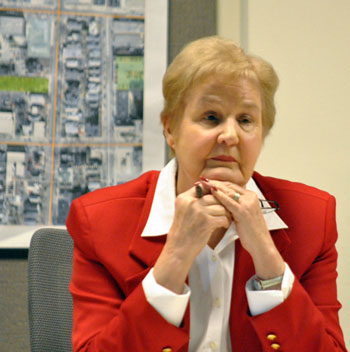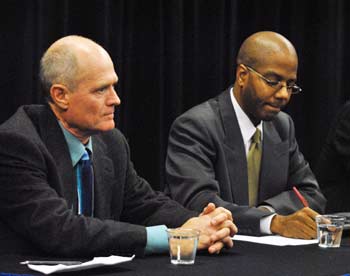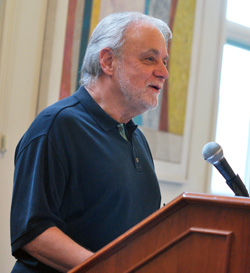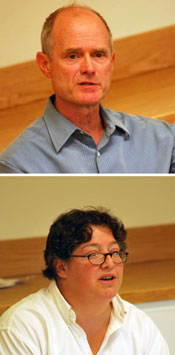Ann Arbor Downtown Development Authority board meeting (Feb. 6, 2013): The meeting of the full DDA board reprised much of the same content of the operations committee meeting two weeks earlier, which focused on the organization’s budgets for the next two fiscal years. The board voted to approve budgets for FY 2014 and FY 2015.

Leah Gunn, chair of the Ann Arbor Downtown Development Authority board. (Photos by the writer.)
For FY 2014, the DDA budget calls for $23.1 million in expenditures against $23.4 million in revenues. That would add about $300,000 to the total fund balance reserve, which is projected to end FY 2014 fiscal at around $5.5 million. The surplus from FY 2014 would be used in the FY 2015 budget, which calls for $23.8 million in expenditures against $23.5 in revenues, leaving the DDA with about $5.2 million in total fund balance reserve at the end of FY 2015. Reserve amounts indicated in the budget are about $800,000 more than the “true fund balance” – because the money lent to the DDA by Republic Parking for installation of new equipment is recorded as revenue.
Some of the larger categories of expenses in the $23.1 million expense budget for FY 2014, which is similar to FY 2015, are: payments to Republic Parking for operating the public parking system ($6.5 million); bond payments and interest ($6.6 million); payments to the city of Ann Arbor ($3 million in parking revenue and $500,000 for the police/courts facility); capital costs ($2 million); administration ($800,000); and alternative transportation ($615,000).
The alternative transportation allocation would fall a bit short of covering this year’s $623,662 request from the Ann Arbor Transportation Authority to support the getDowntown program, which includes a subsidy to cover the cost of rides taken with the go!pass. That compares with $553,488 granted by the DDA last year to support getDowntown. A presentation made previously to the operations committee – by Michael Ford, CEO of the AATA, and Nancy Shore, director of the getDowntown program – was also given to the full board at the Feb. 6 meeting. The presentation highlighted the fact that 31% of go!pass riders get on the bus east of US-23.
Money in the budget labeled “discretionary” could cover the gap between AATA’s request and the amount in the budget slated for alternative transportation. That money is one of a number of “placeholder” items included in the budget – like $250,000 for a possible arrangement with the city of Ann Arbor for additional police patrols in the downtown. Another $300,000 could be used for a range of capital projects – from sidewalk improvements for patio dining in the State Street area, to streetscape improvements for William Street, to alley improvements near the Bell Tower Hotel.
The board did not discuss remarks made earlier in the week by Ward 3 city councilmember Stephen Kunselman, who at the council’s Feb. 4 meeting called for a number of changes to the city’s DDA ordinance. If enacted, the changes could have a significant impact on the DDA’s revenue from its tax increment finance (TIF) budget. Of the DDA’s roughly $23 million revenue budget, about $4 million comes from TIF capture, with the remainder coming from the public parking system.
The DDA board meeting featured public commentary from Alan Haber, a self-described “agitator” for a public park on top of the Library Lane underground parking garage, and a briefing from Ray Detter, chair of the downtown citizens advisory council, on the status of the 413 E. Huron project. The previous evening, that proposed residential project had failed to achieve the six votes it needed for a planning commission recommendation of approval. The project is still expected to be brought to the city council for consideration, possibly on March 18.
The board was also presented with this year’s edition of the DDA’s “State of the Downtown” report, which summarizes a number of statistics about the DDA district. [Full Story]








